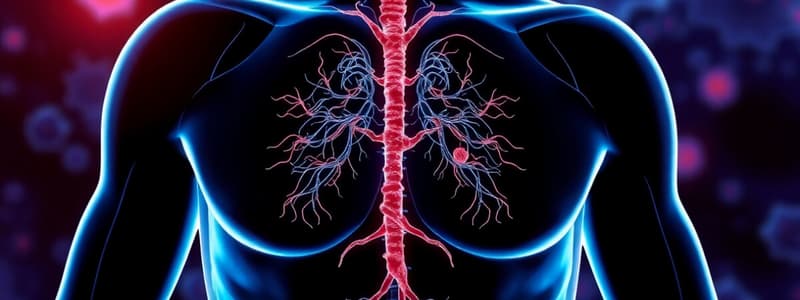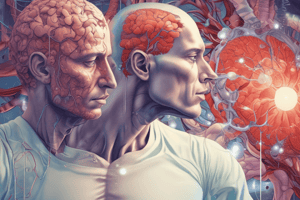Podcast
Questions and Answers
What is the primary function of glucagon?
What is the primary function of glucagon?
- Inhibits fat breakdown
- Decreases insulin production
- Promotes protein synthesis
- Stimulates glycogen lysis to increase blood sugar (correct)
Which hormone is primarily responsible for male characteristics?
Which hormone is primarily responsible for male characteristics?
- Progesterone
- Estrogen
- Thymosin
- Testosterone (correct)
What is the main component of plasma in blood?
What is the main component of plasma in blood?
- Hormones
- Water (correct)
- Proteins
- Cells
What type of blood cell is the most common WBC?
What type of blood cell is the most common WBC?
Which formed element is involved in clotting blood?
Which formed element is involved in clotting blood?
What role do T-cells play in the immune response?
What role do T-cells play in the immune response?
What is the lifespan of erythrocytes in the bloodstream?
What is the lifespan of erythrocytes in the bloodstream?
Which type of WBC transforms into macrophages in connective tissue?
Which type of WBC transforms into macrophages in connective tissue?
What is the function of calcitonin in the thyroid gland?
What is the function of calcitonin in the thyroid gland?
What does thyroxin (T4) contribute to in children?
What does thyroxin (T4) contribute to in children?
What is the role of parathyroid hormones?
What is the role of parathyroid hormones?
What type of hormones are secreted by the adrenal medulla?
What type of hormones are secreted by the adrenal medulla?
What happens during the action of aldosterone?
What happens during the action of aldosterone?
What is the main effect of glucocorticoids like cortisol?
What is the main effect of glucocorticoids like cortisol?
Which gland is responsible for secreting melatonin?
Which gland is responsible for secreting melatonin?
What is the function of beta cells in the pancreas?
What is the function of beta cells in the pancreas?
Flashcards
Thyroid Hormones
Thyroid Hormones
Hormones produced by the thyroid gland, regulating metabolism and growth in children.
Calcitonin
Calcitonin
A thyroid hormone that lowers blood calcium levels by stimulating bone formation.
Parathyroid Hormone
Parathyroid Hormone
A hormone that increases blood calcium levels by breaking down bone.
Epinephrine (Adrenaline)
Epinephrine (Adrenaline)
Signup and view all the flashcards
Aldosterone
Aldosterone
Signup and view all the flashcards
Cortisol
Cortisol
Signup and view all the flashcards
Insulin
Insulin
Signup and view all the flashcards
Melatonin
Melatonin
Signup and view all the flashcards
Glycogen Lysis
Glycogen Lysis
Signup and view all the flashcards
Thymosin
Thymosin
Signup and view all the flashcards
Androgens
Androgens
Signup and view all the flashcards
Estrogen
Estrogen
Signup and view all the flashcards
Progesterone
Progesterone
Signup and view all the flashcards
Plasma
Plasma
Signup and view all the flashcards
Hemoglobin
Hemoglobin
Signup and view all the flashcards
Phagocytosis
Phagocytosis
Signup and view all the flashcards
Study Notes
Thyroid Gland
- Bilobed gland, shaped like a shield of cartilage
- Produces calcitonin (decreases blood calcium levels), thyroxine (T4), and triiodothyronine (T3)
- T4 and T3 are vital for energy production and growth/development, especially in children
- Regulates metabolic rate of all tissues
- Essential for nervous system development
Parathyroid Glands
- Composed of four small glands (usually two pairs)
- Secrete parathyroid hormone (PTH)
- PTH increases blood calcium levels by stimulating osteoclasts (cells that break down bone) and releasing calcium into the bloodstream.
Adrenal Glands
- Located above the kidneys
- Adrenal medulla (inner part)
- Secretes epinephrine (adrenaline) and norepinephrine, modified amino acids
- Released during stress and exercise
- Causes vasoconstriction (narrowing of blood vessels)
- Adrenal cortex (outer part)
- Secretes various steroid hormones
- Mineralocorticoids (e.g., aldosterone)
- Regulate water and electrolyte balance, primarily sodium, prompting kidneys to retain more sodium and water, which increases blood volume
- Glucocorticoids (e.g., cortisol)
- Increase blood glucose levels, critical for brain function
- Important during stress responses
- Gonadocorticoids
- Converted to testosterone and estrogens in peripheral tissues
- Mineralocorticoids (e.g., aldosterone)
- Secretes various steroid hormones
Pineal Gland
- Secretes melatonin
- Involved in regulating circadian rhythms
Pancreas
- Has both endocrine and exocrine functions
- Endocrine portion contains clusters of cells (Islets of Langerhans)
- Alpha cells secrete glucagon
- Increases blood sugar levels
- Beta cells secrete insulin
- Decreases blood sugar levels
- Promotes glycogen formation (glycogenesis)
- Breaks down glycogen to release glucose (glycogenolysis)
- Alpha cells secrete glucagon
Thymus
- Secretes thymic hormones (e.g., thymosin, thymopoietin)
- Crucial in immune system development
Gonads
- Testes (male) produce sperm but mature elsewhere
- Ovaries (female) produce eggs -Secrete estrogen (feminizing hormone) -Secrete progesterone(preparation for pregnancy)
Blood Anatomy
- Plasma: Fluid matrix (90% water) containing nutrients, wastes, proteins (e.g., albumin, fibrinogens, globulins), and hormones
- Formed Elements
- Erythrocytes (RBCs): Biconcave discs, contain hemoglobin, essential for oxygen transport
- Leukocytes (WBCs): Include granulocytes (neutrophils, eosinophils, basophils)—involved in inflammatory responses and phagocytosis, and agranulocytes (lymphocytes, monocytes)—part of the immune system; monocytes become macrophages in tissues
- Platelets: Cell fragments involved in blood clotting
Additional Information
- Monocytes: Phagocytic cells that transform into macrophages in tissues. They are part of the immune system
- T cells and B cells: Types of lymphocytes involved in different aspects of acquired immunity; T cells attack foreign cells and B cells secrete antibodies
- WBCs (white blood cells): various types with different functions in the immune system and inflammatory responses.
Studying That Suits You
Use AI to generate personalized quizzes and flashcards to suit your learning preferences.




